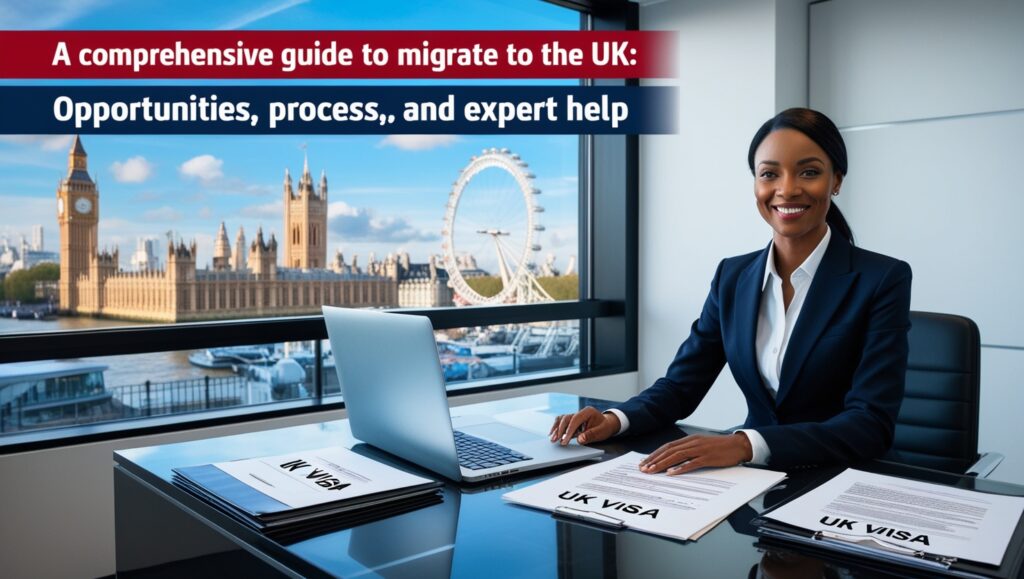The United Kingdom is one of the top destinations for individuals seeking better career opportunities, world-class education, and a higher standard of living. Whether you’re planning to move for work, study, or family reasons, the UK offers a wide array of benefits that make it an attractive destination for immigrants. However, understanding the visa and immigration process can often be overwhelming. This guide will help you navigate through the essential aspects of the journey to migrate to UK, along with expert tips to make your transition smoother.
Why Migrate to the UK?
There are many reasons people choose the UK as their destination for migration, ranging from economic opportunities to lifestyle factors. Here are a few key reasons why the UK is a popular choice:
- Career Advancement: The UK is home to a booming economy with robust industries such as technology, healthcare, finance, and engineering. Professionals moving to the UK can benefit from high salaries, career progression, and access to global networks.
- Top-tier Education: The UK is renowned for its prestigious universities and world-class educational institutions. Students from around the world flock to the UK for higher education and research opportunities.
- Cultural Diversity: The UK is a multicultural society where people from various backgrounds live together harmoniously. Immigrants can enjoy a rich cultural experience and connect with people from all over the world.
- Healthcare and Public Services: The UK has one of the most advanced public healthcare systems in the world, the NHS (National Health Service), which provides healthcare services for residents.
The Immigration Process: Key Steps to Migrate to the UK
Moving to the UK involves a structured immigration process, and it’s essential to choose the right visa based on your purpose for migrating. Below are the key visa categories for those wishing to migrate to the UK:
1. Work Visa
For those seeking employment, the UK offers various work visas depending on your profession, skill level, and employer sponsorship. The most common visa types include:
- Skilled Worker Visa: For individuals who have a job offer from a UK employer with a valid sponsorship license.
- Global Talent Visa: For highly skilled professionals in fields such as science, humanities, engineering, and arts.
- Intra-Company Transfer Visa: For employees of multinational companies who are transferring to a UK branch.
2. Student Visa
If you’re planning to study in the UK, you’ll need to apply for a Student Visa. This visa allows you to stay in the UK for the duration of your course and even provides post-study work opportunities through the Graduate Visa.
3. Family Visa
If you have a family member who is a British citizen or settled in the UK, you may be eligible for a Family Visa. This visa category covers spouses, civil partners, children, and elderly relatives.
4. Investor or Entrepreneur Visa
For those with significant financial resources, the Investor Visa or Innovator Visa provides pathways for individuals looking to invest in UK businesses or start their own.
The Role of a UK Immigration Consultant
Navigating the complexities of the visa process can be daunting, especially if you’re unfamiliar with UK immigration laws and regulations. A UK immigration consultant can provide invaluable assistance in ensuring that your application is processed smoothly. These consultants offer the following services:
- Visa Eligibility Assessment: They help you understand which visa type is best suited for your needs.
- Documentation Support: Consultants assist in gathering the required documentation, ensuring that everything is in order before submission.
- Legal Guidance: UK immigration consultants stay up-to-date with the latest changes in immigration laws and can offer legal advice on how these changes may affect your application.
- Application Submission: From filling out forms to submitting your application, consultants provide end-to-end support throughout the process.
- Post-Arrival Support: Some consultants also offer help with settling in, finding accommodation, and understanding the local laws.
Overcoming Common Challenges
While the prospect of moving to the UK is exciting, it’s essential to be prepared for the challenges that come with it. Here are a few common obstacles and how to overcome them:
- Visa Rejections: To avoid the disappointment of visa rejection, ensure that you meet all eligibility requirements and provide accurate information in your application. Working with a UK immigration consultant can significantly reduce the risk of rejection.
- Cultural Adjustment: Moving to a new country often involves adjusting to different customs, language, and lifestyle. Taking language classes, attending cultural events, and engaging with local communities can help ease this transition.
- Financial Preparation: Moving to the UK can be expensive, especially in major cities like London. It’s important to plan your finances carefully and ensure that you have enough funds to support yourself during the initial period of your move.
Conclusion
Migrating to the UK is a life-changing decision filled with opportunities for growth, whether you’re seeking career advancement, quality education, or a better lifestyle. While the immigration process can be intricate, understanding the visa options and working with a trusted UK immigration consultant can significantly ease your journey. From selecting the right visa to providing legal guidance and post-arrival support, an immigration consultant ensures you have the best chance of a smooth transition. With careful planning and expert help, you can confidently embark on your new chapter in the UK, ready to embrace all the possibilities it offers.
